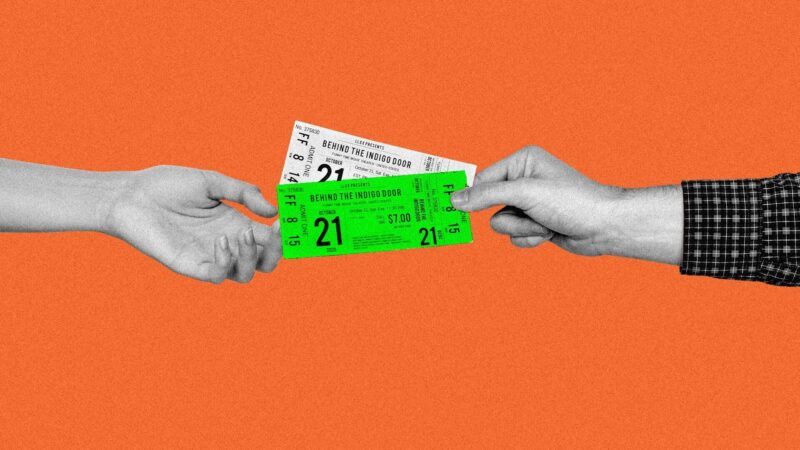More Government Intervention Won't Make Concert Tickets Cheaper
There's only one way to eliminate the scalping market: Charge more for tickets.

The Department of Justice (DOJ) and the Federal Trade Commission (FTC) have requested public comment on "unfair and anticompetitive practices in live ticketing." Paying more to see your favorite band—just like for anything else—is frustrating. But neither ticket retailers nor scalpers are to blame for high prices; consumer demand is.
President Donald Trump signed an executive order on March 31 that directs the FTC to rigorously enforce the Better Online Ticket Sales Act. Signed into law in 2016, the act outlaws the circumvention of measures used to enforce ticket purchasing limits and other rules set by ticket retailers. The executive order also directs both antitrust agencies to enforce competition laws in the concert and entertainment industry.
Don Boudreaux, professor of economics at George Mason University, tells Reason the antitrust angle is confusing. "It's hard to see how the original sellers can be charged with behaving monopolistically since the entire thing begins with [them] charging prices that are too low," he says.
Trump's order blames "unscrupulous middlemen who sit at the intersection between artists and fans and impose egregious fees while providing minimal value." If these middlemen provided as little value as Trump purports, there would be no demand for their services, and they would cease to exist. But they do; the role they serve is allocating those tickets to the people who value them most highly.
At the same time, ticket scalpers are not engaged in "depriving fans of the opportunity to see their favorite artists," as Trump says. Instead, they "ensure that those persons who attach the highest value to attending the performances are the ones who attend the performances" by raising prices to the market-clearing level, explains Boudreaux. Such an allocation is called "efficient," and it is what antitrust enforcers are tasked with protecting.
Abigail Slater, assistant attorney general of the Justice Department's antitrust division, said, "Competitive live entertainment markets should deliver value to artists and fans alike." Both parties to the trade are presently enjoying surplus (otherwise the trade wouldn't occur). If artists and venues want to enjoy more surplus from sales of their performances, they must set a higher initial price for tickets, or "scalpers" will do so for them.
Andrew Ferguson, chair of the FTC, said that "Americans feel like they are being priced out of live entertainment by scalpers, bots, and other unfair and deceptive practices," but that's not the heart of the matter: Americans who can't afford the market-clearing price of tickets are being priced out of the live entertainment market by those who can.
"Scalpers (bots or otherwise) make the market more like an auction where the price is a bigger part of allocating the tickets," says Brian Albrecht, chief economist of the International Center of Law and Economics. Since "there's nothing nefarious about it or anticompetitive," Albrecht tells Reason he's "left wondering what plausible theory of harm the agencies have in mind when it comes to scalpers."
Antitrust laws can be enforced as rigorously as possible, but their enforcement will not change the fact that popular performances with limited runtimes, few seats, and many fans bidding for them means the market-clearing price is often above that set by artists, venues, and retailers.


Show Comments (15)